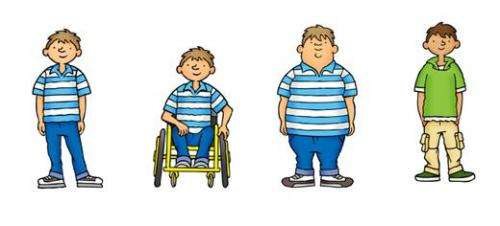Young children appear to reject story characters who are obese

(Medical Xpress)—Research by the University of Leeds has shown that very young children appear to reject story book characters who are overweight, but not those who are disabled.
Led by Professor Andrew Hill from the Leeds Institute of Health Sciences, the research investigated young children's ratings of, and choices between, story characters drawn as overweight, normal weight, or disabled.
It found that children voiced negative views about the fictional book character 'fat Alfie'.
More than 100 UK reception and primary school pupils were read a storybook which covered the same plot, showing three children and what happened when their cat got stuck in a tree. Using colour illustrations and a simple text narrative, the books only differed in the way that the main character was drawn.
After the story, children rated Alfie and also Thomas, one of the other children in the book who was always normal weight, on several attributes and behaviours. Clear differences were apparent when children chose between Alfie and Thomas. Fat Alfie was less likely to win a race, do good school work, be happy with the way he looks, get invited to parties, and more likely to be naughty at school. In contrast, wheelchair Alfie was less likely to do good school work or get invited to parties.
Both fat Alfie and wheelchair Alfie were rejected in favour of Thomas as a personal friend. In particular, only one of 43 children chose fat Alfie over Thomas.
Professor Andrew Hill said: "This research confirms young children's awareness of the huge societal interest in body size. It shows that by school entry age UK children have taken on board the negativity associated with fatness and report it's penalties in terms of appearance, school activities, and socially.
The researchers also included a female version of the story, which was shown to a second group of reception and schoolchildren, with just two of 30 children choosing fat Alfina over Holly.
"This negativity was shared by another visibly different characterization, a child in a wheelchair, but to a far smaller extent. Children rejected the fat character regardless of whether the character was male or female," Professor Hill continued.
"Children's own gender made no difference to their choices. But there was some evidence that older children expressed more negative views.
"Young children have negative perceptions of overweight that are not common to other visibly different conditions, and most apparent as social rejection. These responses are early indications of the views accepted as typical of older children and which may underpin weight-related victimisation of peers."
The results of the study were presented at the European Congress on Obesity (ECO) in Liverpool.














